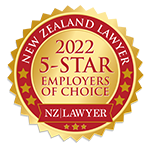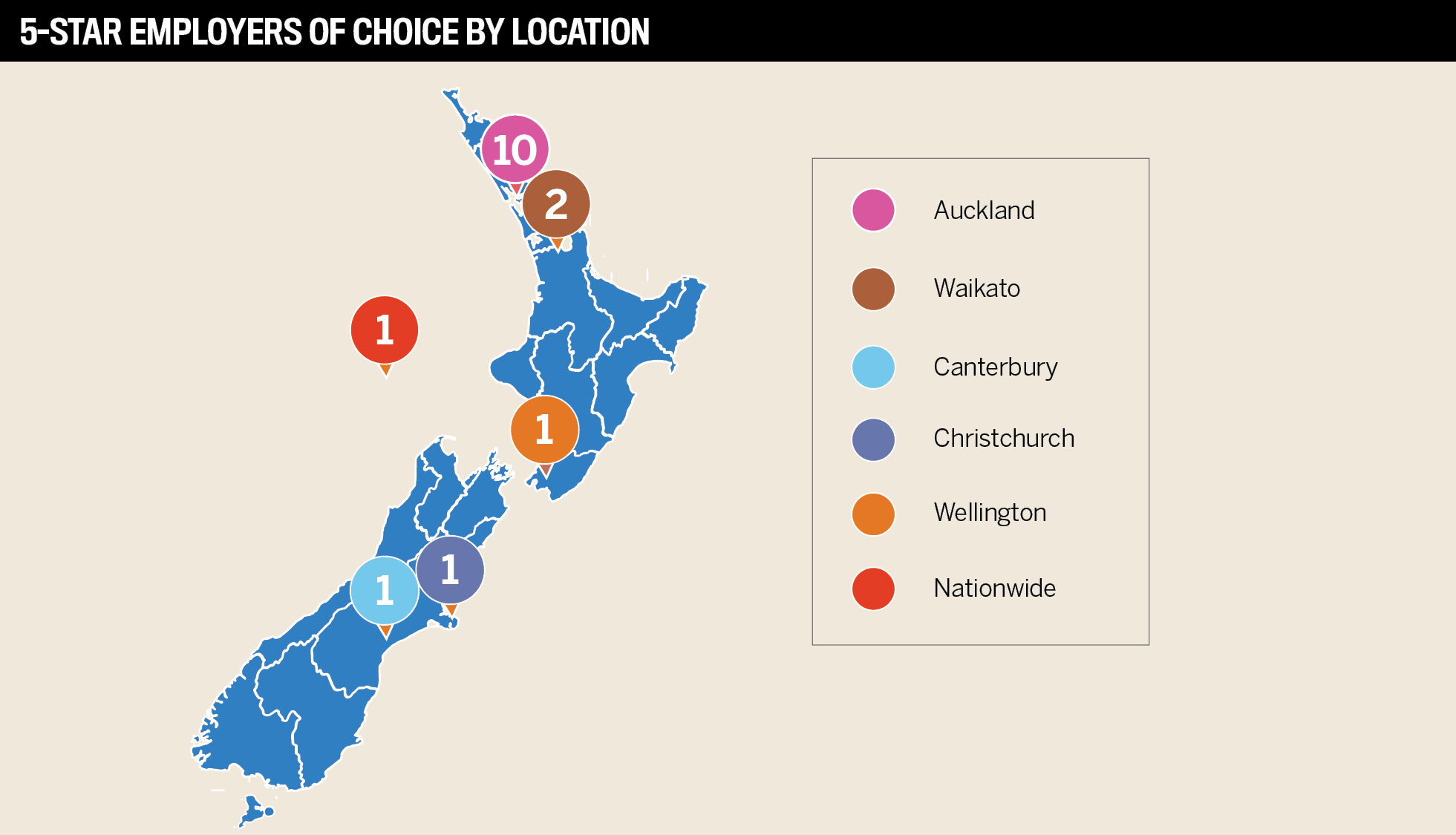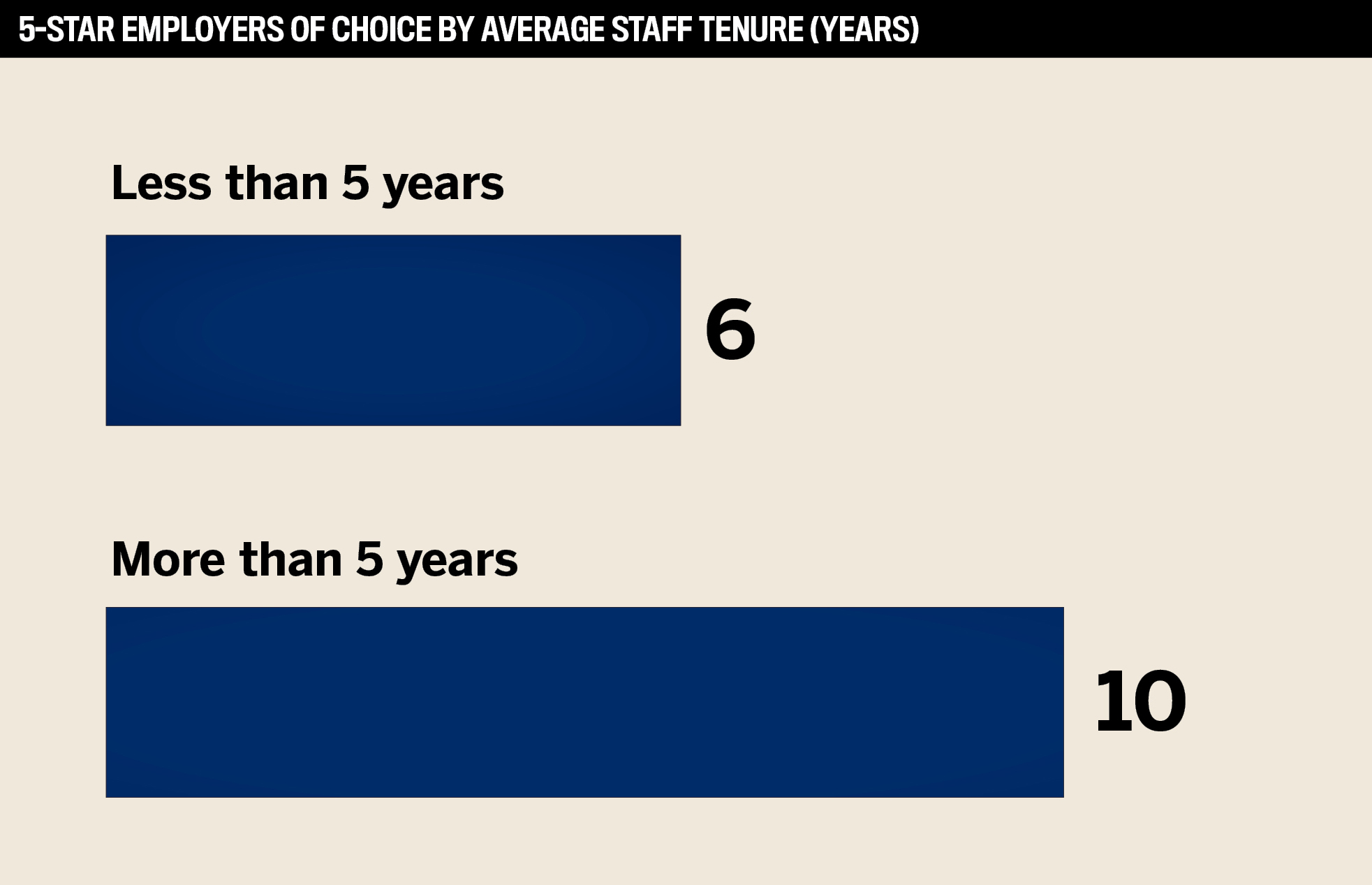

Jump to winners | Jump to methodology
It’s a candidates’ market in the New Zealand legal profession. The national unemployment rate of 3.3% is a record low and the government has even streamlined the immigration system to help relieve workforce shortages.
The 5-Star Employers of Choice have responded to these developments accordingly. Gone are the archaic practices of trying to shackle staff to long-term commitments. Rather, the winning firms have altered their ways of working to accommodate employees’ interests outside of work. Even more impressively, these firms are willing to let people go to fulfil other ambitions, and are keeping the door open to hopefully welcome them back down the line.
The reopening of borders has once again made overseas experience (OE) an option for young and new lawyers. Firms have had to develop different ways of addressing employees’ desires to relocate. And lawyers are now in a stronger position to ask for what they want.
“We are 100% supportive of our people having a wider exposure to the world, and highly value the benefits of that to them as lawyers”
Matthew Jones, Wynn Williams
“[Lawyers] are a lot more aware of their value and how strong the market is from their side of the fence at the moment,” says Kirsty Spears of McLeod Duminy Legal Recruitment. According to the results of a survey conducted by the organisation at the close of 2021, the biggest factor for lawyers in considering a role was a strong workplace culture.
Expanding on that, Spears adds how gimmicks like pool tables and video games are inconsequential. She explains, “They used words like collaborative, friendly, relaxed, open and inclusive. They wanted a culture where individual performance didn’t take precedence over the team culture and created false internal competition – that was something people didn’t want.”
Nonetheless, Spears stresses the obvious – salary was still important.
With financial constraints easing compared to when the COVID-19 pandemic was at its height, remuneration is on the rise.
Apryl Burgess, managing consultant in the legal team of specialist recruitment agency Robert Walters, adds, “Salary expectations have increased across the board. I’ve also seen instances where people are offered a sign-on bonus as well as a salary review within the first six to 12 months, which provides more comfortability if the starting salary isn’t exactly in line with their initial expectations. Some are looking for salary reviews within three months of starting.”

A 2022 Employer of Choice, Anderson Lloyd, has tackled the candidate-tight environment by maintaining connections, even with those who leave.
“We accept that people do want to travel and experience working overseas and since travel restrictions have been lifted, we have seen people taking up this opportunity,” CEO Richard Greenaway explains.
“We keep in touch with our leavers and work with them on how to encourage them home.”
Meanwhile, Matthew Jones, COO of 2022 Employer of Choice Wynn Williams, believes that because many firms in New Zealand took care of their staff, “there’s perhaps a greater sense of loyalty amongst lawyers to their firm than there previously may have been”.
“We look for ways to enable opportunities for our people to still travel – perhaps take an extended break or a secondment – with the comfort of them knowing that their jobs are here for them when they return,” he explains. “We are 100% supportive of our people having a wider exposure to the world, and highly value the benefits of that to them as lawyers.”
Norling Law, another winner, has chosen to maximise the reach of flexibility to working outside of the country.
“One of our staff who wanted to relocate overseas now works permanently and remotely from abroad. This work structure has been working successfully. We are open to flexible arrangements for the right people,” director Brent Norling says.
Helen Mackay, director of 2022 Employer of Choice Juno Legal, points out that embracing creative and flexible work arrangements is key to addressing recruitment issues.
“The number of senior lawyers wanting to make significant life changes and explore flexible working options has increased. For some, this has involved moving to provincial areas for lifestyle reasons and working fully remotely; for some, it is about reducing their legal work week so they can focus on other passions and projects; and for others, to work on a full-time project basis and take longer breaks for travel,” she says.
“We are fortunate to have built a solid and steady team and all of our lawyers are senior (10 years PQE+) so most have scratched the OE itch. If our people’s life paths take them in a different direction to Juno, we are always happy for them and wish them well. Often, they go on to become future clients or referral champions.”
“For us, the best retention strategy is to treat our people well and to give them high-quality work and opportunities to develop alongside balancing their other life interests”
Helen Mackay, Juno Legal
More than just keeping tabs on talent who have departed, Anderson Lloyd also ensures that its culture is the sort that staff are eager to return to.
“To support our people, we recently completed a remuneration review to ensure that we provide our employees with competitive salaries, and we have also reviewed our benefits such as parental leave, our Christmas gifts and healthy living allowances,” Greenaway shares.
Anderson Lloyd recently upped its leave entitlement benefit for primary carers from 10 to 26 weeks. The firm’s salary package also includes other wellbeing benefits, high-quality work, and training and career development opportunities.
“With offices in four key locations including Auckland, Christchurch, Dunedin and Queenstown, [Anderson Lloyd provides] the opportunity to build close relationships across the firm and we encourage a culture of shared knowledge and expertise, development and mentorship,” he says.
To explore this further, NZ Lawyer teamed up with Auckland Law School and surveyed their students, and their answers backed up what the winners are saying. When asked about their motivation for studying law, 46% cited being able to influence society and justice. While 64% stated that salary is not the most important factor for them when seeking employment, the students listed reasons such as culture, work-life balance, and job satisfaction.
In order to attract new talents, firms need to be on top of progressive diversity and inclusion initiatives as well. One way Anderson Lloyd has done so is by investing in cultural competency related to the Indigenous Māori culture. This was another issue confirmed by our research with Auckland Law School, where 100% of respondents did not identify as Māori or as an Indigenous person of New Zealand.
“We continue to develop our cultural intelligence program to enhance the firm-wide understanding of te ao Māori,” Greenaway explains. “Anderson Lloyd has also established a diversity, equity and inclusion staff working group who generates discussion, ideas, initiatives and suggestions that align to the firms’ objectives.”
The firm also provided support to Sweat for Pride for the past two years and in the last year raised more than $11,000 for the benefit of Rainbow communities in Aotearoa.
Meanwhile, in addition to ensuring that the salaries it offers remain in line with market rates, Norling Law implemented a new incentive and bonus policy in June.
“Each year, Norling Law will contribute a set percentage of its net profits to a bonus pool. At the end of the year, the funds in the pool get distributed to all staff,” Norling explains. “The percentage to be received by each staff is determined through the KPIs achieved and maintained by them throughout the year.”
Norling himself holds regular individual meetings with staff to craft career development plans and provide guidance. The firm also introduced a relaxed leave policy that allows employees to take breaks at short notice without explanation as long as crucial deadlines are not affected.
Juno Legal also conducts personal development meetings to help staff meet their five-year goals.
“For us, the best retention strategy is to treat our people well and to give them high-quality work and opportunities to develop alongside balancing their other life interests,” Mackay says.
With a growing number of firms offering flexible working arrangements in a profession that has largely adapted to using technology, a challenge has been keeping employees connected to one another.
“Technology has been a fantastic and critical solution to bridging that engagement in times when we couldn’t physically be in the same place but it’s not, and shouldn’t be seen as, a replacement for the workplace,” Jones points out.
Wynn Williams hosts in-person meetups for its practice teams, including lunch at training sessions. The firm encourages staff to take part in teambuilding exercises like group spin classes, escape rooms and team dinners.
“All of these things encourage people into the workplace and to thrive as members of a team who know each other and trust each other,” Jones explains.
“To support our people, we recently completed a remuneration review to ensure that we provide our employees with competitive salaries”
Richard Greenaway, Anderson Lloyd

The still-reverberating impact of the pandemic continues to serve as a reminder that anything can happen. However, firms are mostly optimistic about what the future holds for the legal profession. For Greenaway, this is evident in “the high calibre of candidates for [Anderson Lloyd’s] summer clerk positions.”
Jones adds that the changing legal landscape may generate new opportunities.
“As society becomes more complicated, the law will need to adapt; there is also a tsunami of legislative change coming – both of which will result in which new and challenging work and potentially allow for further specialisation,” he says.
The Juno Legal team anticipates that the profession will transition from “a sellers’ to a buyers’ market where true client centricity will be key.”
“We foresee a rise in the nascent profession of legal operations in New Zealand and an increasing number of allied legal roles in legal teams to look at how legal services can be more effectively and efficiently delivered,” Mackay predicts.
On 31 May, NZ Lawyer announced the start of the nomination period for the 5-Star Employers of Choice 2022 list, which for the second year, puts the spotlight on law firms that have introduced the most effective employee-centred programs.
The research team identified a number of key factors in a positive employee experience, namely: remuneration, training and professional development, career progression, diversity and inclusion, access to technology and resources, communication, leadership, work-life balance, health and wellbeing, reward and recognition, and recruitment. Firms were asked to list the initiatives they had implemented in these areas, as well as their related achievements.
Nominees were also asked to provide quantitative and qualitative information to support their claims of being top workplaces. A total of 16 firms cleared the bar to make up the second batch of 5-Star Employers of Choice.
63% of the 5-Star Employers of Choice are based in Auckland
5+ years is the average staff tenure in 10 of the winning firms
8 of the winning firms have 1-99 employees